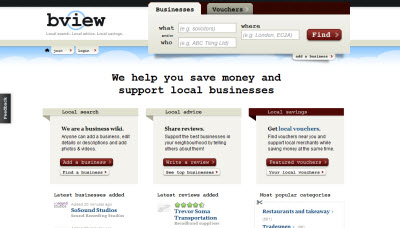When Web 2.0 becomes show me the money
Two UK web startups iterate their business models to focus more closely on pulling in some cash.
It’s always intriguing to see how startups and particularly web startups refine their sites and their business models.
And these shifts in priorities are thrown in to stark relief for web businesses like Bview and Cmypitch.com which launched mid-2008 by the full horror of the financial crisis which hit our TV screens and VC funding last October.
It now looks like the Web 2.0 sensibilities of user generated content and community are giving way to ‘where’s the revenue’ as people realise only sites the size of Facebook and Twitter can afford to make no money.
Runways are considerably shorter than they used to be.
When Bview launched in the Spring/Summer of 2008 it seemed set on being a UK Yelp! with networking, local small business reviews and the added hard edge of Experian credit data leveraged by its parent price-comparison company Xbridge.

Bview's design is not a thing of beauty, but is the local business site sitting pretty after a revenue rethink?
Then today I receive a press release which describes Bview as the UK’s largest voucher search engine. Â Whoa … Â not what I was expecting.
So I quizzed co-founder, Colin Bruce, about the shift in emphasis. He said:
We looked at what businesses really wanted and thought about what new features we could add. Â There’s a lot going on in the affiliate space, so it made sense to do something in that area and in essence we’re developing a voucher aggregation site.
The reviews or content element of the site are seen as a commodity to help drive traffic towards the revenue generating vouchers.
Although vouchers from large retailers predominate at the moment, Bview is still very much positioned as a site focusing on the ‘local’.
The announcement today, for example, promotes the fact that Bview’s vouchers will be displayed on Google maps allowing small businesses to offer discounts to a very focused online audience.
An interesting model which as Bview builds out its APIs is likely to create partnership opportunities with other search engines and price comparison sites.
Cmypitch has also had a radical overhaul.

Cmypitch looks a lot clearer than it did at launch, but will it have the traffic to make affiliate revenue count?
At its launch Cmypitch.com seemed to be a UK version of Vator.tv, a place to pitch on video for funding and clients – plenty of user generated content combined with networking, forums and editorial. That said, the homepage design was extremely confusing.
As Ian Wallis at Cmypitch admits:
We always had lead generation services on the site, but the homepage was far too confusing and the navigation didn’t make much sense. Â So we decided to switch to a much more product focused site.
Cmypitch hasn’t just reworked its site, it’s reworked its business model by focusing, like Bview, on a share of affiliate revenue from offering small businesses special deals and price comparison.
The original subscription-based model, asking small businesses to pay up front for potential leads, wasn’t proving popular as the recession started to bite.
Building traffic to the site to build revenue is a priority, but Cmypitch is also exploring white labelling and syndicating its deals and quick quotes services to other sites to extend distribution.
Both sites offer a web startup story for our times.
Revenue is very much the new ‘pre-revenue’.
Leave a comment
Share & Comment
Related Posts
SME News
- Entrepreneurs 2012 with President Bill Clinton 13-16 November
- IDCEE 2012. Internet Technologies and Innovations
- Nurturing the next generation of social entrepreneurs
- Get Britain Trading needs you
- Manufacturing gains, but economy fragile
- Minister to answer webcast questions on apprenticeships
- Staff beat £230 million a day cost of big freeze
 SME Blog
SME Blog
 1 comment
1 comment












“inspiration for entrepreneurs”? LOL Cmypitch has gone bust. These smoke-and-mirror businesses are based on hype and a perfect example of how not to run a business. Pity commentators get sucked in by their glitz, rather than analysing their businesses carefully.
While Emmett Kilduff has shut-up shop at his cmypitch.com business and gone off to do a fancy job at Morgan Stanley, he has left a lot of people in tears having lost a lot of money.